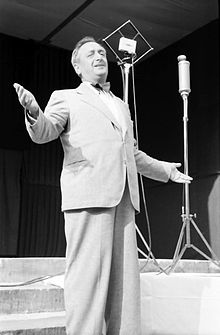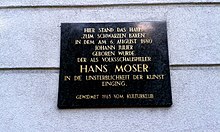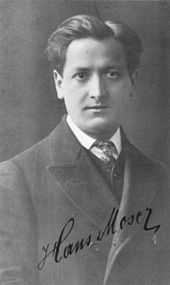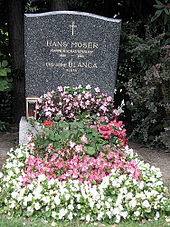Hans Moser
Hans Moser (born August 6, 1880 in Vienna ; † June 19, 1964 there ) was an Austrian folk actor . His real name was Johann Julier . Jean Julier or Jean Juliet are often incorrectly mentioned as official names.
Life
Johann Julier was the third of four children of French-born Hungarian Franz Julier (1838–1898), an academic sculptor , and his wife Serafina (1852–1912), who ran a dairy shop on Vienna's Naschmarkt . He grew up in Vienna- Margareten . A commemorative plaque has been placed on the following building, Rechts Wienzeile 93–95, where the Hotel Ananas is located today. Even as a child, Moser dreamed of the stage, but his parents were against an acting career. According to her wishes, the future actor began an apprenticeship as an accountant in a leather goods store.
The young Johann Julier received speaking lessons from the court actor Josef Moser , whose family name he adopted as his stage name. Then he went on touring theaters across the country. In 1897 he had his first engagement at the Reichenberg City Theater in Bohemia . The apparent breakthrough followed in 1903 when he was appointed to the prestigious Theater in der Josefstadt , which was then headed by Josef Jarno . He failed, however, because his appearance and height of 1.57 m made him unsuitable for the lover roles appropriate to his age. Therefore, in 1907 he went again with touring theaters through the countries of Austria-Hungary ; from 1910 he had smaller revue , cabaret and theater engagements in Vienna. On August 5, 1911, he married Blanka (later: Blanca) Hirschler (1890–1974), who came from a Jewish family. In 1913 their daughter Margarete was born. This year he had his first successes in solo roles as a comedian in the basement stage "Max and Moritz" in St. Annahof (Vienna) .
During the First World War he served on the Isonzo front with the German masters and used jokes to distract his comrades so admirably from the cruel everyday life of the war that from now on he saw his future in the comic field. After the war he had regular appearances in the Viennese cabarets “ Budapester Orpheum ”, “Reklame”, “Hell”, “ Leopoldi-Wiesenthal ” and in Heinrich Eisenbach's “Intimate Theater”. In 1922 Fritz Löhner-Beda wrote the solo one-act play " I am the caretaker of the Siebenerhaus " for him . In 1923 Robert Stolz finally noticed him and engaged him for a revue at the Ronachertheater . Two years later, Max Reinhardt brought the actor back to the Theater in der Josefstadt, where he played in plays by Nestroy , Schnitzler and Horváth . In 1925 the first article about Moser's work appeared in the Neue Freie Presse , where he was described as the youngest and last Viennese Hanswurst .
He quickly became Reinhardt's favorite actor and accompanied him on his US tour in 1927/28, where he could be seen in " Midsummer Night's Dream " on New York's Broadway, among other places . In Vienna he was soon only called “Der Moser” - just like the popular actor and comedian Alexander Girardi once referred to as “Der Girardi” . Moser became a very busy actor and comedian on the Viennese stages. There he played mumbling, rumbling, grumbling (Viennese peculiarity of gossiping and whining) and with circular movements strange types, mostly servants or other petty bourgeois such as grocers , tailors and servants , but also circus characters. In 1922 he took on the role of a notary in “Clothes Make People” , followed by smaller roles in silent films. He also achieved great fame with his role as a “mute” servant in “The Family Without Morals” . But it was only in the sound film that he was able to develop his full originality, as he had already shown in the theater. He got his first role in a sound film in 1930 as a supporting actor in "Money on the Street" .
Hans Moser often portrayed people in his films who undergo major changes in the course of the plot. In Das Gäßchen zum Paradies he plays a dog catcher who becomes a dog lover, in Anton, the last one a limitless admirer of the nobility who mutates into the advocate of the little man, in Das Ferienkind a disgruntled pensioner who once made his own daughter because of the choice had rejected her husband and became a loving grandfather through his grandson, and in Der Herr Kanzleirat an old misogynist who fell for a young woman in his later days.
During the National Socialist era , Moser refused to agree to a divorce from his Jewish wife. In 1939 she had to emigrate to Hungary , Moser's daughter, who was already married, emigrated to Argentina. It was only because of his popularity that Moser was able to continue working as a film actor in German films despite his marriage. After the Second World War , the couple lived together again in the villa in Vienna-Hietzing, Auhofstrasse 76-78.
After the end of the war, Moser was engaged, among other things, at the Vienna Burgtheater , where he received the highest praise from critics and audiences, especially for his embodiment of Weiring in Arthur Schnitzler's Liebelei .
In 1961, Moser played once again the magical king in Ödön von Horváth's Tales from the Vienna Woods for an Austrian TV version , which he had embodied in 1931 at the premiere in Berlin . In 1964, Hans Moser died of lung cancer . Moser was buried in Vienna's central cemetery, mourners were Franz Jonas , Paul Hörbiger , Paula Wessely with daughter Christiane Hörbiger . In 1974 his wife Blanca was also buried in the central cemetery.
Moser's frequent film partners were Theo Lingen and Paul Hörbiger , with whom he was also friends.
Moser was also a popular singer of Viennese songs . The best known is probably the phylloxera . His distinctive mumbling voice is still used today by voice imitators in cabaret and for advertising purposes. The contemporary press sometimes spoke of "Nuschel-Moser".
Contrary to popular belief, the expression “mosern” or “rummosern” is not derived from Hans Moser, but from the Yiddish or Red Welsch synonymous “mossern”. In the Viennese dialect, the expression "moan" is rarely used, here it means "grumble" instead.
Inheritance dispute between mother and daughter
Their daughter Margarete emigrated to Argentina after she married the Romanian businessman Martin Hasdeu in 1935 . In July 1948, Hans Moser traveled to South America to see his daughter, where he also gave a guest performance at the German-speaking theater in Buenos Aires . The daughter asked her parents for an advance on her inheritance in order to build a living in Buenos Aires. Her mother never forgave her. When Margarete adopted an Argentine boy after the death of her child in 1963, the conflict deepened. In 1971 her mother disinherited her. After her mother's death in 1974, Margarete went to court against the disinheritance. Only after 15 years of court hearings did she receive the compulsory portion of her father's inheritance of 12 million schillings , but died six months later. Blanca Moser bequeathed most of the assets to the "Hans and Blanca Moser Foundation".
Filmography (selection)
Silent films
- 1918: the baby
- 1923: Hoffmann's stories
- 1924: The city without Jews
- 1924: Ssanin
- 1925: The Toys of Paris
- 1926: The Feldherrnhügel
- 1926: Schützenliesel
- 1927: The family without morals
- 1927: Madame makes an affair
- 1928: lace panties and cobbler's bad luck
- 1928: The Lampelgasse
Sound films
- 1930: money on the street
- 1930: darling of the gods
- 1931: The rejuvenated Adolar
- 1931: Limited Liability Marriage
- 1931: You don't need money
- 1931: One night in the Grand Hotel
- 1932: a pleasant patient
- 1933: Madame does not want children
- 1933: My songs quietly plead
- 1933: the big trick
- 1933: short circuit
- 1933: Fox on the hunt
- 1934: masquerade
- 1934: Her Excellency's Daughters ( Die kleine Trafik )
- 1934: Frasquita
- 1934: Polish blood
- 1934: Carnival and love
- 1934: The young Baron Neuhaus
- 1934: High school
- 1935: Heaven on earth
- 1935: Vorstadtvarieté (Die Amsel von Lichtental)
- 1935: spring parade
- 1935: Schimek family
- 1935: Knox and the merry vagabonds (Saran circus)
- 1935: A winter night's dream
- 1935: ... just a comedian
- 1935: The whole world revolves around love
- 1935: The journey into the youth
- 1935: Eva
- 1935: end of the line
- 1935: A young man from Oxford (accountant Schnabel)
- 1936: Burgtheater
- 1936: The alley to paradise
- 1936: You shouldn't go to sleep without kissing
- 1936: practical jokes
- 1936: Confetti (Confetti)
- 1936: Hannerl and her lovers
- 1936: Everything for Veronika (the clever guy)
- 1937: The missing woman
- 1937: The man they talk about
- 1937: The happiest marriage in the world
- 1937: The unexcused hour
- 1937: My son, the Minister
- 1937: The bat
- 1938: mother song
- 1938: Thirteen chairs
- 1938: Whenever I'm happy
- 1938: The restless girls
- 1938: Small district court
- 1938: The stars shine
- 1939: The disgust
- 1939: Opera Ball (by Géza von Bolváry )
- 1939: love is strictly forbidden
- 1939: People from the Varieté
- 1939: Anton the Last
- 1940: Viennese stories
- 1940: Seven years of bad luck
- 1940: The gentleman in the house
- 1940: My daughter lives in Vienna
- 1940: The unfaithful Eckehart
- 1940: Roses in Tyrol
- 1941: We ask for a dance
- 1941: Love is duty-free
- 1942: Viennese blood
- 1942: Be the Lord for once
- 1942: Dove andiamo, signora?
- 1942: Seven years of happiness
- 1943: Sette anni di felicità
- 1943: mask in blue
- 1943: Carnival of Love
- 1943: Adventure in the Grand Hotel
- 1943: black and white
- 1943: The holiday child
- 1943: travel acquaintance
- 1944: Schrammeln
- 1944: the millionaire
- 1946: Renee XIV
- 1946: The world is turning upside down
- 1947: Hofrat Geiger
- 1948: Mr. Chancellery
- 1948: The singing house
- 1949: Viennese girls
- 1949: By a nose's length
- 1949: 1 - 2 - 3 - out!
- 1950: Theodor in the football goal
- 1950: Now it strikes 13 (It strikes 13)
- 1950: kissing is not a sin
- 1950: There is something in the air
- 1951: two in one car
- 1952: Hello service man
- 1952: April 1, 2000
- 1952: Shame on you, Brigitte
- 1952: You are the rose from Lake Wörthersee
- 1953: The uncle from America
- 1953: once without worry
- 1954: Holland girl
- 1954: Imperial maneuvers
- 1954: People in love
- 1955: Yes, that's the way it is with love (marriage sanatorium)
- 1955: The German champions
- 1955: Yes, yes, love in Tyrol
- 1955: The three from the gas station
- 1955: Congress dances
- 1956: Symphony in Gold
- 1956: one heart and one soul
- 1956: Lumpazivagabundus
- 1956: Opera Ball
- 1956: My aunt - your aunt
- 1956: Kaiserball
- 1956: While the roses are still blooming
- 1956: red poppy seeds
- 1957: Schimek family
- 1957: Waiter, pay!
- 1957: Four girls from the Wachau
- 1957: The unexcused hour
- 1957: The twins from Zillertal
- 1957: The linden landlady from the Danube beach
- 1957: blue today and blue tomorrow (a crazy family)
- 1958: Hello taxi
- 1958: As long as the stars glow (circus children)
- 1958: Ooh ... this vacation
- 1958: Countess Mariza
- 1958: The Scapegoat from Spatzenhausen
- 1958: love affair
- 1959: Mr. Josef's last love
- 1959: The beautiful liar
- 1961: Stories from the Vienna Woods
- 1961: Mariandl
- 1961: ... and you, my darling, stay here
- 1961: The farmer as a millionaire
- 1961: fear of hell
- 1962: Three love letters from Tyrol
- 1962: Mariandl's homecoming
- 1962: The sold grandfather
- 1962: The bat
- 1963: Lieutenant Gustl
- 1963: Liliom
- 1963: Emperor Joseph and the railway attendant's daughter
- 1964: Life is the greatest show
Discographic notes
- Servus Wien (with Paul Hörbiger, 1964, last published recording with Hans Moser)
Awards and honors

- 1950: Ring of Honor of the City of Vienna for Moser's special artistic achievements and thus his services to the city. The awarding of the ring of honor was decided on September 29, 1950 by the Vienna City Council. On June 13, 1951, Mayor Theodor Körner presented the ring on the occasion of Moser's 70th birthday.
- 1961: Kainz Medal
- 1961: Appointment as chamber actor
- 1962: Film tape in gold for many years of outstanding work in German film
- 1998: Name of the Hans-Moser-Park and the alley Am Hans-Moser-Park in Vienna- Hietzing
- 2014: In the comic book Der Blöde und der Gscheite - The best double conferences ( Amalthea Signum Verlag | Drawings: Reinhard Trinkler | Text: Hugo Wiener ) Hans Moser played a leading role as a drawn figure alongside his long-time film partner Paul Hörbiger
literature
- Fritz Koselka : A little big man. Hans Moser. The life path of man and the artist. Eberle, Vienna 1946.
- Oskar Maurus Fontana : Hans Moser, folk comedian and actor Donauland, Vienna 1965
- Hans Moser, I have a piece of old Vienna in my heart. Recorded by Georg Markus . With a foreword by Paul Hörbiger. Herbig, Munich 1980, ISBN 3-7766-1044-1 .
- Hedi Schulz: Hans Moser. The great folk actor, how he lived and played. Molden, Vienna et al. 1980, ISBN 3-217-01147-3 .
- Karin Wichmann: Hans Moser. His films, his life (= Heyne books 32, Heyne film library . Volume 28). Heyne, Munich 1980, ISBN 3-453-86028-4 .
- Willibald Eser : Hans Moser. Have the honor - his life, his films. Moewig, Munich 1981, ISBN 3-8118-4106-8 .
- Georg Markus: Hans Moser. The estate. Kremayr & Scheriau, Vienna 1989, ISBN 3-218-00495-0 .
- Dodo Kresse, Michael Horvath : Just a comedian? Hans Moser in the years 1938 to 1945. Edition S et al., Vienna 1994, ISBN 3-7046-0516-6 .
- Edith Marktl: Moser, Hans. In: New German Biography (NDB). Volume 18, Duncker & Humblot, Berlin 1997, ISBN 3-428-00199-0 , p. 189 f. ( Digitized version ).
- Ulrike Dembski, Georg Markus (ed.): Hans Moser. 1880-1964. Brandstätter, Vienna 2004, ISBN 3-85498-361-1 .
- Franzobel : Moser or the passion of the weekend living room god. Passagen-Verlag, Vienna 2010, ISBN 978-3-85165-831-6 .
- Danielle Willert: Hans Moser's most beautiful films, film posters and scenes recall the greatest successes of the Austrian film legend. Sutton Verlag GmbH, Erfurt 2017, ISBN 978-3-95400-872-8 .
Film about Moser
- Hans Moser in private. FRG, 1961. 15 min., Director: Jacques Renard. ARD A visit from Peter Frankenfeld to Hans Moser. First broadcast July 6, 1961.
- That was Hans Moser - memories of a great comedian. Documentary, FRG / Austria, 1969, 60 min., Director: Helmut Dimko. Broadcast by ZDF / ORF on the 5th anniversary of death. First broadcast: July 26, 1969 (ZDF)
- Hans Moser , Series: Stars that passed , first broadcast: May 2, 1977 (WDR)
- Subject: Hans Moser , Series: All or nothing , First broadcast: January 28, 1986 (ARD)
- The eternal servant - a portrait of Hans Moser. Documentary, Austria, 50, 2010, p 50 Min, written and directed. Wolfgang Liemberger , production: Thalia film, ORF , 3sat , Row: zeit.geschichte , first broadcast: August 21, 2010 at ORF III , Summary of ORF , Video on YouTube , December 18, 2017, accessed on March 4, 2018. Among others, with Senta Berger , Christoph Waltz , Otto Schenk , Waltraut Haas , Karl Merkatz , Lotte Michner (Hans Moser's niece).
Web links
- Literature by and about Hans Moser in the catalog of the German National Library
- Hans Moser in the Internet Movie Database (English)
- Pictures by Hans Moser In: Virtual History
Individual evidence
- ↑ Julier Franz. Photos of the grave of Hans Moser's father at the Vienna Central Cemetery. In: viennatouristguide.at. Retrieved November 26, 2018 .
- ↑ Rudolf Simm: Reichenberg - a short portrait. In : reichenberg.de , November 20, 2009, accessed on January 28, 2018.
- ↑ Who were Hans and Blanca Moser? (No longer available online.) In: Hans and Blanca Moser Foundation / Medical University of Vienna . Archived from the original on August 2, 2015 ; accessed on July 24, 2017 .
- ↑ From Birth to Death: Historic Addresses in Vienna. In: stadtbekannt.at. August 8, 2018, accessed September 22, 2019 .
- ↑ Funeral of the actor Hans Moser at the Vienna Central Cemetery, funeral procession comes out of the church, the coffin is carried over a staircase, behind it the procession of mourners, on the sides numerous wreaths of flowers and funeral guests. Black and white photo by Fritz Kern, October 24, 1964. In: bildarchivaustria.at. Austrian National Library, accessed on September 16, 2019 .
- ^ Hugo Portisch, Georg Markus: Between us said: encounters with contemporary witnesses . Amalthea Signum, 2014, ISBN 978-3-902998-58-3 , pp. 66 .
- ^ Hugo Portisch, Georg Markus: The beloved father, the hated mother: Hans Moser's family tragedy. In: Between us said: encounters with contemporary witnesses. Amalthea Signum, Vienna 2014, ISBN 978-3-902998-58-3 , p. 66 ( limited preview in Google book search)
- ↑ Georg Markus : Only the audience is to blame , Amalthea Signum, Vienna 2014, ISBN 978-3-902998-48-4 , p. 156 ( limited preview in Google book search)
| personal data | |
|---|---|
| SURNAME | Moser, Hans |
| ALTERNATIVE NAMES | Julier, Johann (real name) |
| BRIEF DESCRIPTION | Austrian folk actor |
| DATE OF BIRTH | August 6, 1880 |
| PLACE OF BIRTH | Vienna |
| DATE OF DEATH | June 19, 1964 |
| Place of death | Vienna |






